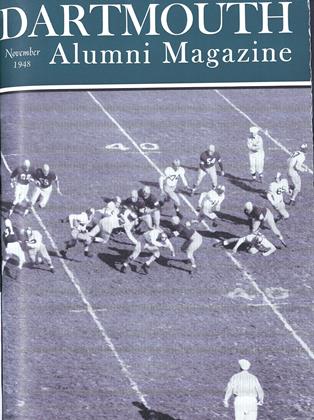MY ILLUSTRIOUS FRIEND Frank Horan '22 collects and reads the books of Graham Greene and I hope that in time he will present his collection, through the "Friends," to the Dartmouth College Library. Meanwhile Greene's newest novel The Heart of the Matter (Viking) has received serious critical attention. The scene is a West African town in wartime, a place where the moist heat saps bodily strength and produces fecklessness and lethargy. There is Scobie, upright, resisting the corruption of the place by a detachment which is part acquiescence, and part kindliness. There is Scobie's wife, and the young widow Helen Rolt. Scobie sins, and pays the price which is ultimately his self-administered dissolution.
[ think this may be said about this novel: The darkness of moral disintegration broods over the book with the tense inevitability which pervades Hardy's Judethe Obscure. It is unrelieved and unrelenting. The characters are alive. They have weaknesses, but are not abandoned. Pity can lift them over pettiness. Particularly Scobie. But this is a moral tale; more, it is a religious tale, as old as The Fall, with original sin in conflict with the gift of redemption and the grace of forgiveness: an old tale in a contemporary setting. Graham Greene has written nothing better than this, nothing more deliberate; and he carries the reader most of the way to conviction. I have read every novel of Greene's since The Man Within, 1929, and this is probably his richest in achievement, even if it may lack the tension and excitement of A Gun for Hire, or BrightonRock.
Charles M. Warren's Valley of theShadow (Doubleday) might easily be missed but it really is a tight and interesting story of how the West Pointer, Lt. John Reardon, stalked the Apache Deesohay just after the Civil War. Warren shows he knows Gettysburg by flashbacks in the lives of Reardon's men. The book is not for the squeamish but Warren can write most readable adventure. The book is deceptively good and should not be confused with the casual historical fiction with which we are swamped.
No doubt you have already read Cleveland Amory's The Proper Bostonians but if not I strongly recommend it.
If you like to read popular biography written in the guise of fiction I can recommend a few worth reading:
1. Ainsworth, William Harrison: Rookwood, 1834. A Gothic romance woven around the career of Dick Turpin, the notorious highwayman. I think a reprinting of this would be successful. 2. Barrington, E.: Glorious Apollo, 1925. This concerns Byron and his love affairs. Recommendation enough?
3. Bell, Neil: Cover His Face, 1943. A story of the tragic life of Thomas Chatterton, the Bristol poet who, at eighteen, penniless and starving, locked himself in a garret and committed suicide.
4. Garnett, David: Pocohontas; or theNonpareil of Virginia, 1933. The wellknown story of the Red Indian princess who embraced Christianity and married an Englishman, John Rolfe, in 1613, and came with him to England three years later. There is a horrible scene of a hanging on board which shows David Garnett's great powers of vivid description.
5- Graves, Robert: King Jesus, 1946. Although a hundred pages of this novel pass by before the birth of Jesus Christ it is a re-writing of the story of the Gospels as explained and rationalized by the author. The result is a remarkable novel and one which will startle many readers.
6. Komroff, Manuel: The Magic Bow, 1941. The life of the wonderful Italian violinist Nicolo Paganini who was born in Genoa in 1784.
7. Stone, Irving: Lust For Life, 1935. The paintings of Vincent van Gogh are sufficiently popular to ensure the reading of this fine novel about the man. Much of his life was passed under the shadow of insanity and in 1890 he shot himself.
8. Twain, Mark: Personal Recollectionsof Joan of Arc, 1896. He considered this one of his most important books, and spent a lot of time studying Joan's life and trial. (Jeanne D'Arc by T. Douglas Murray is the standard source of her trial, etc.)
9. Waddell, Helen: Peter Abelard, 1933. From the twelfth century comes a passion which is remembered more today than the theological system of the man it swept and dominated. The story of Heloise's denial of Abelard, a denial prompted by her love, transcends the religious background of this excellent book.
 View Full Issue
View Full Issue
More From This Issue
-
 Article
ArticleCIVIL RIGHTS IN AMERICA
November 1948 By ROBERT K. CARR '29, -
 Article
ArticleA Report from Europe
November 1948 By EDWIN A. BOCK '43 -
 Class Notes
Class Notes1924
November 1948 By JAMES T. WHITE, RICHARD A. HENRY -
 Class Notes
Class Notes1918
November 1948 By ERNEST H. EARLEY, DONALD L. BARR, DAVID L. GARRATT -
 Article
ArticleConvocation Address
November 1948 -
 Class Notes
Class Notes1929
November 1948 By F. WILLIAM ANDRES, EDWIN C. CHINLUND, MORTON C. JAQUITH
HERBERT F. WEST '22
-
 Article
ArticleHANOVER BROWSING
October 1935 By Herbert F. West '22 -
 Article
ArticleHanover Browsing
November 1937 By HERBERT F. WEST '22 -
 Article
ArticleHanover Browsing
June 1938 By HERBERT F. WEST '22 -
 Books
BooksPEPPERFOOT OF THURSDAY MARKET
June 1941 By Herbert F. West '22 -
 Article
ArticleHanover Browsing
April 1944 By HERBERT F. WEST '22 -
 Article
ArticleHanover Browsing
January 1951 By HERBERT F. WEST '22







